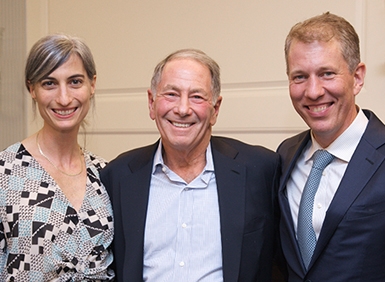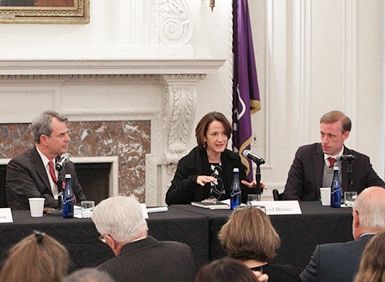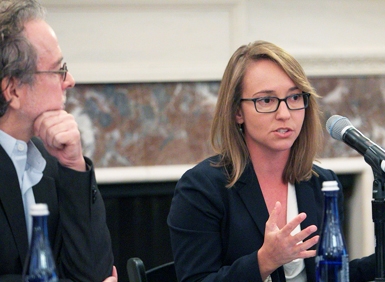At a Reiss Center on Law and Security conference, experts discuss US national security in a shifting geopolitical landscape
As the Trump Administration continues to reshape the United States’s foreign alliances and trade commitments amidst a backdrop of significant geopolitical changes, a day-long conference sponsored by the Reiss Center on Law and Security (RCLS) brought together policymakers, federal security officials, and other experts to examine what these foreign policy shifts means for the US as a global power and for lawyers and policymakers in the national security field.
The Oct 22 conference also served to celebrate the center’s new name and renewed agenda and leadership. Founded in 2003 as the Center on Law and Security, the Reiss Center has been renamed in honor of a gift from the Reiss family: Richard Reiss, Jr. ’69, his late wife Bonnie Feldman Reiss ’69, and their children Lauren Reiss Frank and Michael Reiss.
“Rick [Reiss] has been an enormous friend to the Law School,” said Dean Trevor Morrison in his opening remarks, turning to Reiss, who was seated in the audience. “It is an honor to name the center after you and your family.” Morrison also noted that the changes to the center will allow NYU Law to continue to lead in the transforming field of national security policy. “This is a really exciting time for the Law School and for this center,” he said. “It marks the beginning of a new chapter.”
Now helmed by executive director Rachel Goldbrenner ’08, a lawyer and former policy official, the center aims to address questions of national security through public dialogues, fellowships, and research. It also provides a new home to Just Security, the online law and security forum started by Anne and Joel Ehrenkranz Professor of Law Ryan Goodman, who will serve as a faculty director of the center, along with Dean Morrison and Professors David Golove, Stephen Holmes, and Samuel Rascoff.
“This is an era of significant change and uncertainty—from geopolitics to technology—and as a center we are looking forward to the emerging questions and challenges that national security practitioners will need to confront,” said Goldbrenner.
The four-panel conference examined a range of current issues, including the midterm elections and journalism in a time of rampant disinformation, among other topics.
In a panel entitled “Seismic Shifts? Changing Priorities and Competing Visions for a Rules-Based Order,” security experts discussed how the Trump administration’s departure from international accords such as the 2015 Paris Agreement, which seeks to combat global climate change, and the Iran nuclear deal have affected the “rule-based order,” or the informal international commitment to prevent conflict, set rules based on evolving global standards, and mobilize cooperation.
Jake Sullivan, former national security adviser to Vice President Biden and deputy chief of staff to Secretary of State Clinton, said that the Trump administration views transnational agreements as a constraining force, antithetical to US interests.
“Trump believes that, by definition, any multilateral arrangement is the concession of US bargaining power because if we bargain with each country one-by-one, we’re bigger than they are so we can get more out of it,” Sullivan said.
Internal polarization between the US’s executive and legislative branches has made it difficult to pass treaties to cement international agreements into law, said Avril Haines, former deputy national security advisor to President Obama and former deputy director of the Central Intelligence Agency.
“The United States has been a critical author of the system, and has an outsized influence on the system, and as a consequence, our dysfunction is outsized in terms of our ability to stymy the system,” Haines said. “Trump is clearly having a negative impact on that, but this is a trend…This is something that we’ve seen prior to Trump, in a sense, for many years now. In the Clinton administration, we were passing 25 treaties a year. Since 2009, it’s been about 2.5 treaties a year.”
While all the panelists appeared to agree that the prevailing order is under significant strains, John Bellinger, former senior associate counsel to President George W. Bush and former legal adviser to the National Security Council, said that this order has been idealized, and the US should create new structures pursuant to American interests abroad.
“The international order, rules-based system, was not perfect. We can’t be too nostalgic, we can’t go backwards. It’s a myth that it was, in fact, even an order,” Bellinger said. “Even from the point of view of the United States, it was not perfect. There’s more than a kernel of truth in a lot of Donald Trump’s concerns, he just doesn’t go about acting on those concerns the way maybe some of the rest of us would.”
In the conference’s closing panel, Tess Bridgeman ’10, RCLS senior fellow and visiting scholar and former special assistant to President Obama, agreed that the changing geopolitical landscape began before the Trump administration, but that this administration’s emphasis on nationalism and rejection of multinational cooperation have accelerated the breakdown of the international order.
“What is new is this way of constructing [national identity] in a way that makes the US an erratic variable, even on some of the things that we've held to be most foundational,” she said.




